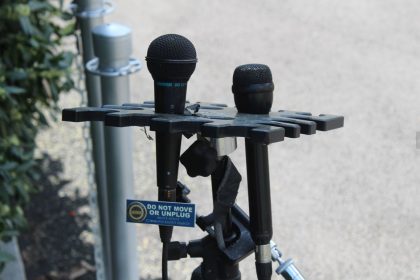Presidents’ Feuds With Press, From America’s Earliest Days

WASHINGTON — While it may seem that the White House’s relationship with the media is in an appalling state, Historian Harold Holzer claims that the president vs. press feud is actually nothing new. In fact, President Trump’s antagonism barely measures up to several past occupiers of the Oval Office.
“I’m sure you are all going to miss… Trump,” Holzer quipped at a National Press Foundation briefing held this week in which he touted his new book “The President vs. The Press,” suggesting that while the media’s relationship with the president is complicated and often uneasy, Trump did provide constant content and fodder for high page views and ratings.
Yet the idea of fake news, insulting of journalists at news conferences, and branding media as the enemy of the people aren’t attacks that began with the current administration. Much of this squabbling dates as far back as George Washington’s time in office. And of the 18 Presidents Holzer details in his book, Trump doesn’t even come close to being the worst or most belligerent.
In the Colonial period, all newspapers were village papers, bringing in port news and very local information. But “the press got more politicized as the country politicized,” said Holzer, and party control of newspapers was commonplace. “By the Adams era, all newspapers were either Federalist or Democratic-Republican.”
Throughout Jackson’s presidency and the Antebellum period, every major city had a Democratic or Republican/Whig paper, and they were quite open about their allegiances. The idea of objectivity, whether it actually exists or not, is more of a recent phenomenon, “so whether newspapers fueled the rift or vice versa is hard to say,” said Holzer.
Transgressions against the press started in the nation’s early days. Adams signed sedition statutes to prosecute journalists; Lincoln imprisoned editors during the Civil War and had the Union Army shut down between 200 and 300 newspapers by confiscating the presses. Wilson and Roosevelt pushed back on freedom of the press with their “Loose lips sink ships” propaganda campaign; and even Obama cracked down on scrutiny “in an effort to root out leaks in what he called high-security moments,” according to Holzer.
Most presidents felt they served as the media’s punching bag with undeserved beatings, but some did attempt to manipulate the power of the press to their own benefit.
Jackson used access to the White House as a “system of reward,” said Holzer, who also suggested that he gave government-friendly newspapers contracts in what he dubbed an “interlocking directory.”
It may have been Theodore Roosevelt whom Holzer claimed did more to alter president-press reactions than any other in office, courting press attention, staging photo opps, offering scoops, and even giving the media workspace in the White House. But despite all of this, it was Teddy’s fifth cousin Franklin who was most successful in his relationships… albeit with some egregious disparagements.
“For 12 years he held a kind of sympathetic friendship with the press,” said Holzer. FDR felt he could charm journalists with access and dinner invitations, and it worked to a large extent. For example, an unspoken gentleman’s agreement kept writers and photographers from publishing photographs of Roosevelt in his wheelchair even before this rule was officially enforced during World War II.
Still, he could be harsh. “[FDR] may not have called someone a ‘nasty woman,’ but he did say, ‘That’s a stupid question. Go stand in the corner and wear a dunce cap,’” Holzer said.
Whether friends or frenemies, keeping the press close has generally worked better for presidents than hostility or arrogance. Clinton, who was the only president personally interviewed for Holzer’s book, admitted that one of his biggest mistakes with the press may have actually been having the door between the press corps in the basement and his press secretary’s door locked. “This caused DeeDee Myers [his press secretary] to be subjected to anger and hostility,” said Holzer. “I’m sure there’s a [lesson] about an ‘open door policy’ somewhere in there.”
Since George Washington, there has been pushback by presidents on the notion of being covered falsely. “The first draft of [Washington’s] farewell address included such an attack of ‘fake news’…” said Holzer. “One of the reasons he gave up the job was that he didn’t want to subject himself to newspaper criticism any longer.”
Jefferson, Lincoln, and Roosevelt used similar terms for what seems to be the result — natural or unnatural — of criticism of the men in the nation’s highest office that dates back to the earliest days of the Republic. “Presidents feel that they are going to be subjected to really close scrutiny if they misstep,” Holzer said, “[though the] refusal to talk to people regard[ed] as adversaries is the craziest [combativeness] yet.”
“The two themes are that the hostility or natural rancor goes back to the first president — though the battle over objective truth may be new — and that the most successful communicators are those who developed alternative means to get unfiltered information to the public,” said Holzer.
For example, Lincoln used telegraphy in new ways; FDR used radio and fireside chats, augmented by his power on newsreels; JFK had televised conferences from the State Department; Obama was first to have a White House website, and Trump was the first to use Twitter.
The historian places the responsibility — or the blame — on the press for increasing the power of Trump’s tweets. “You had panels of experts digesting and combatting his 6 a.m. tweets… [which were] all designed to arouse people indignity.”
“Twitter either represents his attention span or he’s genuinely a genius with these tweets,” Holzer admitted. “I don’t know that he would have been president without Twitter.”
Acknowledging that presidents bring their personalities to bear with press interactions, Holzer searched history to provide advice for Biden’s own media strategy moving forward.
He offered: “Be open. Be tough. And make sure that all of your spokespeople tell the truth.”
























